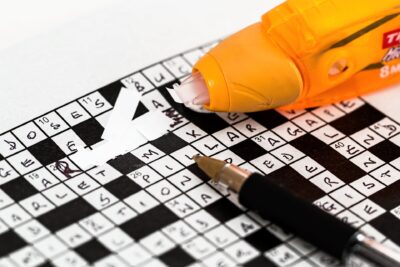
Talk about classic word games and you can’t avoid talking about the crossword. This puzzle was once a dominant form of entertainment for kids and adults alike. But over time, as newspapers and magazines got less popular, and people turned to the internet for entertainment, crosswords began to decline in popularity. Still, crosswords haven’t faded away completely. There are plenty of places you can still get a word challenge through a crossword. If you’re looking to get into crosswords, or just trying to enhance your crossword skills, here are a few tips to keep in mind for your next puzzle.
10 Tips for Solving Crosswords
- Pay attention to the theme.
Most crossword puzzles have a specific theme. Most obviously, kids’ crosswords usually have a theme, be it holiday-related words or a hunt for various circus animals. But bigger crosswords, targeted toward adults, have themes as well. For instance, most NYT crosswords have daily themes. Make sure to pay attention to these! They can offer some major help decoding tricky puzzle clues.
- Pay attention to the puzzle editor/creator/publication.
Likewise, if you’re puzzling on an advanced level, it can be helpful to pay attention to who the publisher, creator, and editor of your crossword are. Some puzzle creators like to use similar themes or words from puzzle-to-puzzle. Others may like to use more wordplay when giving their hints. If you follow and get used to one puzzle creator’s crosswords, you’ll likely find you can intuit the correct answers more quickly each time you play.
Don’t start with the longest word on the board. Though it may be tempting to knock out as many letters as possible, shorter words tend to be easier to guess and spell. Starting out with short words can thus get you moving on your crossword faster.
- Start with proper nouns.
Alternatively, read through the clues and look for the hints that are describing a proper noun. For instance, some crossword hints describe a famous celebrity or landmark. These can be easier to guess because you are less likely to be stuck between multiple options (whereas there may be multiple potential answers for other hints.) Also, once you get this question solved, you can usually be confident in your answer, which can help you move forward in your puzzle successfully.
- Don’t be afraid to pencil in guesses.
Having said that, there’s no shame in entering an answer you’re not sure about. Just don’t use Sharpie. Sometimes, you might think you know the answer to a clue but might not be 100% sure. Try penciling in your suspected answer and seeing how your solving progresses from there. Is the penciled-in word really helping you to move along? Or does it seem to be hurting more than it’s helping? Since you’re working in pencil, you can easily make changes as needed, and this way, you can ensure you won’t forget the potential solution while contemplating other words.
- Double-check your spelling.
Especially for longer words, make sure you’ve spelled everything correctly. If you’re just one or two letters off, you might mistakenly think you’ve gotten the answer wrong. That’s a headache you don’t need to deal with.
Don’t rush. Unlike some other word puzzles or games, crossword puzzles have no timer. Nobody is checking to see how quickly you got your answers: they just want to know if you got them, period. If you find yourself getting frustrated or stuck, then step back, take a breather.
- Keep an eye out for plurals.
If you’re really in a bind, sometimes filling in just one or two squares can feel like a success. If that’s what you’re looking for, try hunting through your clues to find plural words. For instance, if one of the clues is, “Wives of the king,” you can probably assume that whatever word you’re looking for will end in an S. In that case, even if you don’t know the answer to the clue itself, you can try to plug that S into the last square of the puzzle and see if that gets anything moving for you.
- Don’t be afraid to look things up.
Yes, Googling can feel like cheating. But sometimes, you have to give in and know when to ask for help. By looking up an answer, you’ve taught yourself something new that you’ll now know for future games. And, if you’re still partway through a puzzle, looking up just one answer can give you the info you need to find the other solutions on your own. Just make sure you don’t get used to looking up the answer for every word: if you feel the need to get help that frequently, you might want to search for easier puzzles.
- Keep in mind: crosswords are hard!
It can be easy to get upset when you miss a crossword solution or have to look up the answer. But at the end of the day, remember that crossword puzzles are designed to be hard! The puzzle editors don’t want everyone to solve the puzzle in just a few minutes. Take heart in the fact that, if you’re stuck, plenty of other people likely are, too. And over time, as you do more crosswords, they’ll get easier and easier.
Other Puzzling Resources
Were these 10 tips for solving crosswords helpful? Looking for help on other word games? Check out some of our other word game resources, including our Wordle Solver and our Scrabble word finder. Or check out our list of 20 realistic high-scoring Scrabble words to help you out in your next game.

